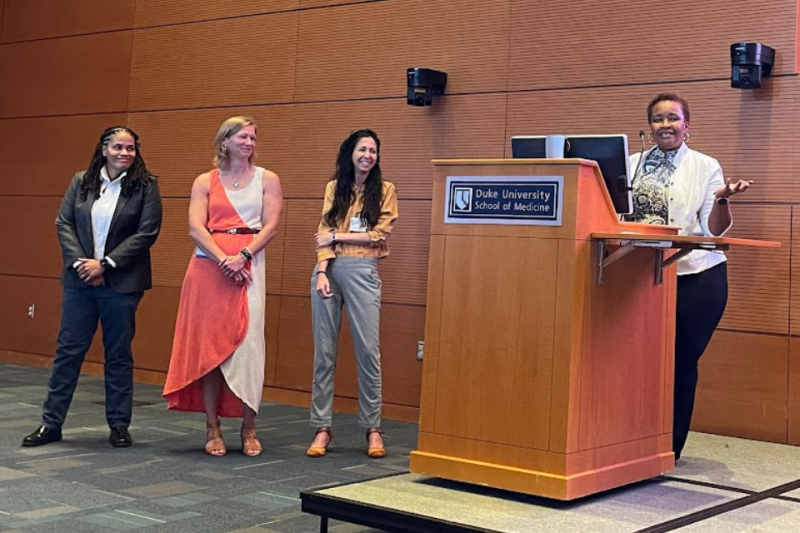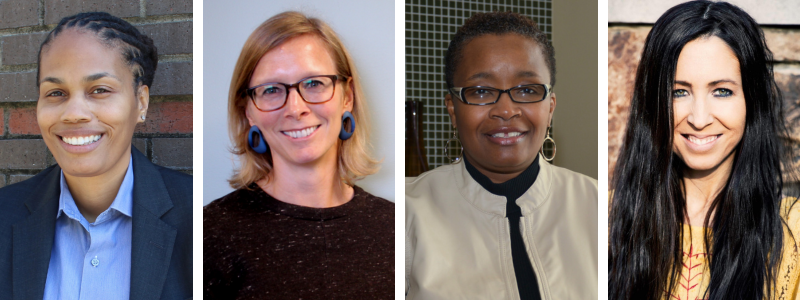
In the summer of 2023, a Duke Psychiatry & Behavioral Sciences team was selected to participate in a new yearlong pilot program, “Shifting the Paradigm: Restorative Justice as a Framework for Workforce Well-Being.” Offered through the Office for Faculty, in partnership with the School of Medicine’s Office of Culture, Engagement & Impact, the program aimed to help address burnout, compassion fatigue, and harms, while promoting workforce wellness and satisfaction in the School of Medicine community.
Annise Weaver, MSEd, CRC, one of the project team members and the department's associate director of work environment, thought the program would offer an opportunity to address a need to provide spaces to help create a sense of belonging for department members. Assistant professor McLean Pollock, PhD, MSW, another team member, noted the prevalence of remote work arrangements as one factor that has made community building challenging in recent years.
Weaver and Pollock, along with colleagues Sheree Harmon, MBA, director of human resources, and assistant professor Angela Tunno, PhD, were eager to explore how restorative justice could help build stronger relationships among department members and lay the groundwork for positive changes in how we interact with one another.
About the Pilot Program
Seven faculty-staff teams across the School of Medicine were selected to participate in the pilot, which included an intensive restorative justice (RJ) training program in the fall of 2023. The curriculum was developed and led by Mara Becker, MD, MSCE, Vice Dean for Faculty at the School of Medicine, and Ada Gregory, MA, associate director of the Kenan Institute of Ethics at Duke University.
The teams then developed and implemented RJ interventions within their individual units, with the support of experienced RJ practitioners and others in the pilot program. Ultimately, the vision is that participants will become part of a longitudinal learning community of people interested in exploring the use of RJ in the School of Medicine.
Restorative Justice 101
RJ is an ethical framework that focuses on building community and resolving conflict through shared values of respect, accountability, and compassion. RJ is rooted in Indigenous traditions, which uphold the belief that people are interconnected and that focus on the role of community in healing and growing practices.
Applied in an organizational setting, the continuum of restorative practices can facilitate an environment to sustain relationships, maintain collective and individual accountability, repair damage caused by harmful behaviors, and ultimately improve workplace culture.
Program participants incorporated restorative practices into team-building, advising, training, and workplace culture initiatives, among other applications.*
One foundational RJ practice, called “circles,” brings together people as equals, sitting in a circle, to share their experiences in an atmosphere of respect and concern for everyone. Each participant gets uninterrupted time to speak, while others listen openly, without question or judgment. Circles can be used for healing, conflict resolution, community building, or celebration. (Source: Healing Justice Project) The department’s RJ team implemented this restorative practice, as well as others, with different groups throughout the year.
The RJ Team’s “Why”
Pollock appreciates the School of Medicine giving teams the opportunity to explore the potential of RJ in their departments and across the school and health system. “We’re working in purpose-driven, help-providing professions, and the humanity is the piece that draws most people into this kind of work,” she noted. “And yet we’re not really able to access it in the way that I think maybe we thought we would when we came into our roles.”
The RJ project, she reflected, has helped create intentional, protected, professionally-sanctioned spaces that not only foster deeper connections among our colleagues but also can lead to meaningful long-term change.
Tunno also sees the promise of RJ in creating far-reaching positive change; she shared a quote from businessman and author Stephen Covey, “Change moves at the speed of trust,” that has always resonated with her. “That’s what really motivated me to think about RJ from a systems change lens,” she said. “Restorative justice is one way to slowly earn trust amongst each other, because you are to show up with your full personhood and not just your professional role,” she said.

From Vision to Implementation
The team’s goals for the pilot included introducing the concept of RJ to the department, presenting about it and conducting RJ circles in various meetings, and offering it as a resource for enhancing workplace relationships and working through issues related to employee relations.
Weaver noted that an early and easy “win” for the project was to infuse RJ into existing meetings the team members were already participating in and leading.
The project enabled Tunno, a psychologist, to expand her use of RJ in meetings related to her clinical and community work in trauma-informed care. She has applied RJ not just to community-building circles, but also to problem-solving through an RJ lens, recognizing that “one person is not responsible for answering all the problems, and we can look to the brain power and the collective wisdom in these spaces.”
And Weaver, program co-director for the North Carolina Psychiatry Access Line (NC-PAL), integrated RJ into weekly NC-PAL team meetings. “We had new people starting, so I was thinking about onboarding,” she said. “And what better way is there to bring people together and welcome new team members than with RJ?” Over time, other NC-PAL team members were invited to volunteer to lead the circle and the meeting, creating a less hierarchical structure that was received well by the group.
Alice Waller, MSW, a program coordinator for NC-PAL, has found the new approach beneficial. “We’ve started beginning meetings with meaningful prompts that bring us into the present moment and spark genuine curiosity and honesty,” she reflected. “I’ve seen our team grow closer, and by being vulnerable with one another, I feel like we’ve been able to lower the cloak of professionalism a bit and relate to each other as humans instead of just colleagues. In turn, this helps us understand each other’s perspectives, offer grace and patience, empathize with one another—and have fun at work!”
“I’ve seen our team grow closer, and by being vulnerable with one another, I feel like we’ve been able to lower the cloak of professionalism a bit and relate to each other as humans instead of just colleagues.”
— Alice Waller, MSW
This fall, a few members of the RJ pilot team helped plan and facilitate the annual psychology internship retreat, which focuses on community building, program assessment, and faculty development. The in-person event, which drew about 25 faculty members, kicked off with program updates and continued with RJ processes of small group listening circles.
“The listening circles created a nice structure to communicate effectively about difficult topics,” said internship director Chris Mauro, PhD. “We were talking about issues related to ensuring inclusivity and fairness in our recruitment and evaluation processes. In terms of the RJ process, it was beautiful. Based on the feedback we received, I think everyone enjoyed it, and it helped faculty feel connected to the program and to each other.”
Outcomes & Looking Ahead
The pilot has ended, but Weaver refers to the project as “under construction,” with many more opportunities to make a positive impact. The RJ team is still reflecting on their work over the past year and seeking ways to continue integrating restorative practices within the department and across the School of Medicine.
Members of the RJ team have led a few dozen activities using restorative practices, touching more than 200 department members. But Tunno is quick to note that the most meaningful markers of the project’s success are increased trust and deeper relationships—outcomes that go far beyond the numbers. “It’s a way of being. It’s a new way of interacting with each other that is authentic, courageous, and vulnerable and that creates the community of trust that’s needed to face the big problems we encounter.”
“It’s a way of being. It’s a new way of interacting with each other that is authentic, courageous, and vulnerable and that creates the community of trust that’s needed to face the big problems we encounter.”
— Angela Tunno, PhD
Harmon believes the RJ initiative offers numerous benefits, noting that it’s helped her and others further develop strategies to create inclusive, socially connected work environments. ”It has been a powerful opportunity. It’s offered us great hope when considering alternatives to deal with exclusionary practices, restore harm, build community, and foster workplace well-being.”
The broader Duke Psychiatry & Behavioral Sciences restorative justice project team includes Tanya Exum-Coston, MBA, Ashley Johnson, PhD, Amanda Stemke, MPH, and formerly Ernestine Briggs-King, PhD (no longer at Duke).
*Source of Restorative Justice 101 content: Restorative Justice Symposium Highlights Activities to Increase Connectedness and Trust